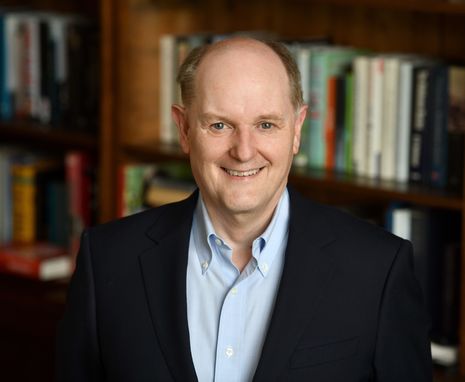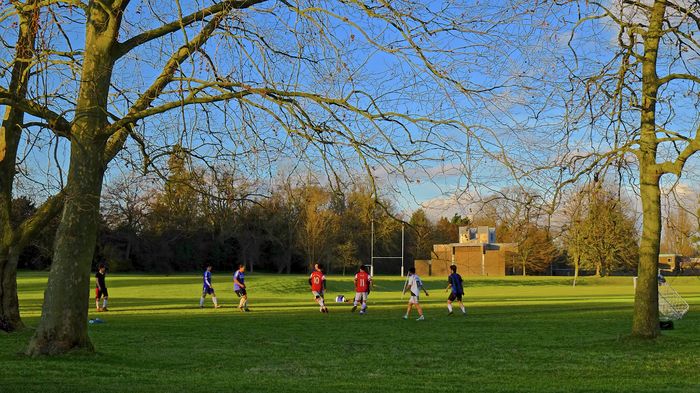London 2012, the BBC and Selwyn College: In Conversation with Roger Mosey
Sports Editor Jack Wadding speaks to the Master of Selwyn College and former Director of Sport at the BBC about the Olympics, broadcasting rights and the beauty of collegiate sport.

Roger Mosey’s story is an interesting one: born and brought up in Bradford and educated at Oxford, he went on to have a long career with the BBC, spanning four decades and including such roles as Controller of Five Live, Head of TV News, Director of Sport (2005-2009) and Head of London 2012’s coverage (2009-2012). Speaking via Microsoft Teams, Roger took us through his journey and what he achieved along the way.
“I’d always grown up as a Bradford City fan”, he tells me as I notify him of the discrepancy between his Wikipedia page and his Twitter account, “but my godson was a big Arsenal fan and we started going to Arsenal in the mid-90s. Then in the 2000s I got a season ticket”. Having grown up in the heartland of Rugby League, he explains that his sporting upbringing was especially diverse. “My dad and my uncle were a little bit fickle in their sport so we went to see Leeds United during the great era in the late 60s, Huddersfield Town a bit… and I always used to love going to see the cricket at Headingley and Park Avenue”. Despite the richness of his sporting upbringing, Roger tells me that he was never necessarily ‘sport-mad’; he had minimal sporting commitments at University and “went through a period in [his] 20s and 30s where [he] didn’t watch much sport and certainly didn’t do much sport”.
Given this measured approach to sport, he explains, understandably, that “some of the family were a bit taken aback when I became Director of BBC Sport”. However, he believes that this is precisely what allowed him the opportunity to take up the role, saying “I think it was because they wanted somebody who really liked sport but not to the exclusion of everything else”. He went on to tell me how the majority of those among the BBC Sport ranks “would think you were crazy if you didn’t take Strictly Come Dancing off when the Snooker second-round match was over-running”.
Roger, on the other hand, rather stumbled across the industry of sports media. Having worked mainly in news beforehand, he told me: “the thing that pushed [him] in a sport direction was becoming Controller of Radio Five Live”, which had, and continues to have, such a strong reputation for sport coverage.
As Director of Sport, Roger oversaw a period of modernisation at the BBC. This was characterised by the executive decision to cancel the institutional sports programme, Grandstand, in 2007, after 49 years of regular broadcasting. Having admitted to having never seen the show, I was told that it had fast been becoming an outdated model of sports coverage. “It’s really difficult to imagine now but in the classic days of BBC Sport they would do twenty minutes of a test match, and then they’d go to the 14:35 horse race at Haydock Park, and then they might go to Wimbledon for half an hour and then back to the test match. That was the consequence of terrestrial channel scarcity”, he explained. While this worked in the days when you could count the number of TV channels on one hand, “what people now want is a test match live all day or Wimbledon live all day”.
“I think in this case we were so completely right”
At the time, given its longstanding regularity, “there were people who were very devoted to it” and as a result, “it was an unpopular move and [the BBC] got a fair bit of flack for it”. However, Roger tells me that he has no regrets; “I think sometimes you look back on decisions and know you were wrong but I think in this case we were so completely right”.
This modernisation was also evident in the BBC’s approach to the London 2012 Olympics. Broadcasting an Olympic Games is always a sizeable feat, as shown by the fact that the BBC’s team for Beijing 2008, of which Roger was a part, comprised 437 different employees from the UK. At the time, “it was the BBC’s biggest ever foreign outside broadcast”. Around this time, however, Roger explains that the idea arose “that we should make the [London] Games available in their entirety so you could watch every minute of every event”. As many of you may remember, this was precisely what the BBC achieved with their 24 dedicated Olympics channels. “It’s a ‘both-and’ thing,” he says. “People really want the big moments on BBC One – twenty million people would watch the 100m final – but you may want to go and watch handball on BBC 23”. As is always the case with the Olympics, you often get into a sport you’ve never seen before and this is precisely what Roger and his team facilitated.
Tied up in this period of modernisation, however, is the competition provided by large commercial broadcasters like Sky and, more recently, BT Sport. As we have all seen over the last decades, the ability of the BBC and other terrestrial channels to retain major sports broadcasting rights is limited. However, perhaps characteristically, Roger is unfazed. “I’m ok with an equilibrium – what I think would be a disaster would be to have the whole lot behind a pay wall”, he tells me, fairly confident in the fact that a certain number of sporting events will remain accessible via terrestrial television.
“Sports that go behind a paywall are watched by fewer people”
He explains that there remains an attraction for sporting bodies to continue selling broadcasting rights to the BBC, since, while paid subscriptions provide greater income, terrestrial TV is a guaranteed way of reaching a bigger audience. “Golf is a good case in point where the Open would be watched by 6/7 million people on a good year [on the BBC] and maybe 1/1.5 million on Sky”. Fortunately, “Wimbledon, the World Cup and the Olympic Games have generally wanted to be on free-to-air TV because they get the biggest audiences”. Perhaps it is no surprise then that these are the biggest sporting and cultural events in the UK.
Interestingly, cricket has recently reversed the visible trend in that The 100 and One-Day T20 matches are now being shown on the BBC again and the England vs India test match is currently being broadcast by Channel 4. “The problem with cricket ten or so years ago was that it just went completely behind the paywall, which means if you can’t afford it, you don’t see it, and that does have a consequence on the sport… and cricket has recognised that”, Roger tells me. So perhaps there is no need to despair – we may yet see more sport on the BBC.
Having left the BBC in 2013, Roger became the Master of Selwyn College, a position in which he has been able to indulge his sporting interest. He tells me that he follows Selwyn’s sport teams with enthusiasm, having been to watch them play in the hockey final as well as the (football) Cuppers Plate Final in 2017, “which I think secretly is a bit like the UEFA [Europa] League, but we won that which was great”.
Upon discussion of the balance between academics and sport, Roger explained that “what [he] really [values] is the ‘mid-level college sport’ where people participate” for the sake of collegiality and sociability. “I think it’s great for people’s wellbeing” and, referring to a University study covered recently by Varsity, “sport certainly doesn’t detract from your academic performance and, arguably, might add to it”. Ultimately, Roger believes that “sport isn’t valued as much as it should be in Cambridge but I think it’s not valued as much as it should be by the nation either”.
As I finish up our conversation, Roger wishes me, and vicariously Cambridge, a speedy return to sports. “Maybe in March?”, he suggests optimistically. Until then, we can only watch and wait.
 Features / How sweet is the en-suite deal?13 January 2026
Features / How sweet is the en-suite deal?13 January 2026 Comment / Will the town and gown divide ever truly be resolved?12 January 2026
Comment / Will the town and gown divide ever truly be resolved?12 January 2026 News / 20 vet organisations sign letter backing Cam vet course13 January 2026
News / 20 vet organisations sign letter backing Cam vet course13 January 2026 Arts / Fact-checking R.F. Kuang’s Katabasis13 January 2026
Arts / Fact-checking R.F. Kuang’s Katabasis13 January 2026 Music / Inside Radiohead’s circle13 January 2026
Music / Inside Radiohead’s circle13 January 2026










